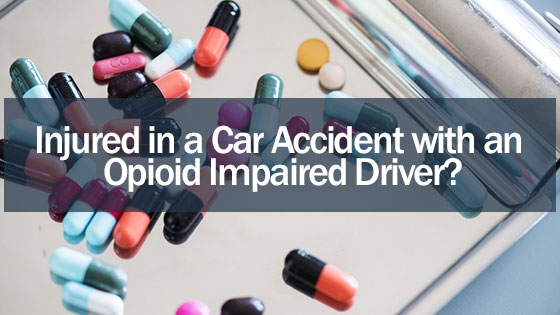The current national focus on the opioid crisis in the United States is being reflected in the state of Texas, as the number of accidents involving intoxicated drivers using opioids is on the increase. While there are multiple issues associated with this complicated problem, it is still a fact that many car accidents involve individuals who are prescribed the medications on a daily basis and still continue to drive. There are specific problems when determining if a driver is legally impaired while driving using opioids, regardless of whether they are legally prescribed or being used illegally by an unauthorized user. The fact that opioid use is legal for some and illegal for others clearly presents a problem for law enforcement officials, and it is beginning to impact those injured in an accident caused by a driver who tests positive. These can be very complicated cases that require diligent investigation by a car accident attorney for proper compensation recovery.

No Obvious Detection
Many times the fact that an “at fault” driver is under the influence of opioids is overlooked because there are often no outward appearances to investigating officers that are offered by smell like alcohol or marijuana use. This can be highly problematic in states that utilize fault law and modified comparative negligence when adjudicating auto accidents. It is actually becoming increasingly obvious that this behavior has been happening for several decades, as many individuals who are prescribed opioids as part of a daily regimen have continued to drive as though they are not medicated. Also known as drugged driving, there is no way of determining how many fatal accidents have occurred because of this issue. The fact that a negligent driver was taking opioids is usually only revealed in a full trial with the driver under oath, potentially denying injured accident victims from receiving financial compensation.
Proving Intoxication
It is incumbent on all injured plaintiffs in Texas to prove their accident was the result of the opposing driver’s negligence. Intoxication levels are critical to full compensation in these claims, as those who are determined as under the influence could be subject to punitive damages as well as compensatory damages. And, when the usage includes truck drivers who may have been medicated when causing a serious or even fatal accident, the trucking companies could be liable in addition to the driver. Drivers who are not prescribed medications are commonly not tested as well because of no outward appearance and the failure to require a blood test indicating such. And even then, the legal task can be difficult. This component of any contemporary accident in Texas means that blood testing should be a first request from a car accident attorney, which also means it is essential to contact an attorney immediately following any serious accident regardless of material facts that can be derived from the official accident report.
Standardized Testing
Another problem with determining if a driver was impaired due to opioid use is applying court-approved latency testing. While alcohol testing can be performed mechanically and is specified in state legislation, the concentration of opioids in a driver’s system is not yet perfected. The mere presence could last typically for three to five days, but the immediate concentration at the time of the crash is not set by a legal standard. The arguments become counterclaims that are difficult to prove, and any presence at all could potentially not indicate impairment. Having a car accident attorney who is willing to provide full and diligent representation is vital for any accident victim when seeking whole compensation, especially punitive damages in serious or fatal accidents.
Contact the Law Offices of David Kohm
Anyone in Texas who thinks they have been injured by a driver under the influence of opioids should call our law offices today at any of our convenient locations and get a free consultation.
Arlington (817) 522-4451
Addison (972) 564-8108
Denton (940) 222-4060
Dallas (972) 362-6848
Garland (214) 572-2251
Fort Worth (817) 764-1375
Cedar Hill (972) 338-9427
McKinney (469) 522-3688
Lewisville (972) 354-4605
Frisco (972) 725-7681
Grapevine (817) 835-8677
Irving (972) 354-4610
Keller (817) 204-0904
Plano (972) 354-4602
You can also contact us online by using our quick contact form.










